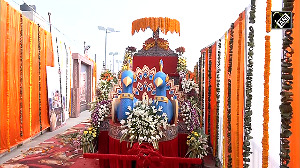Teamlease, India's largest temporary staff provider, has to give pre-paid Visa debit cards to half of its 72,000 employees spread across 670 cities, as no bank is willing to open savings accounts for them.
The Teamlease management thought about debit cards despite the administrative headache and increasing paperwork, but the problem hasn't been resolved. Quite a few of these employees lose their debit cards regularly, leading to police complaints and stop-payment instructions to the bank concerned.
"These employees now demand cash payment from us -- an unintended consequence of a well-intentioned initiative called the Know-Your-Customer (KYC) norms. Worse, we are facing at least a 5 per cent attrition due to this problem alone," says Manish Sabharwal, Teamlease chairman.
Despite the talk of inclusive banking and the RBI's insistence on no-frills banking and low minimum balance accounts, the reality is most banks are unwilling to open individual accounts based on company appointment letters. Given that Teamlease's average salary is over Rs 9,000 per month, the plight of unorganised sector workers trying to access the banking system can be easily imagined.
The current norms represent what Sabharwal calls an "apartheid against our employees" who are mostly labour market outsiders, first-time job seekers, migrants from rural areas, urban poor escaping from the unorganised sector into the organised sector, and so on.
It's obvious then that the KYC norms have noble objectives but their unintended consequences include lower savings, usurious "finance" charges and higher cash transactions. It's not that the RBI hasn't taken care of financial inclusion while framing the KYC norms.
In order to ensure that persons belonging to the low income group do not encounter difficulties in opening bank accounts, the KYC procedures have been simplified for those with balances not exceeding Rs 50,000 and credit in the accounts not exceeding Rs 100,000. The RBI has also put people whose accounts show small balances and low turnover in the low-risk category.
It's also true that quite a few banks have already launched 'no-frills' accounts either with a nil or very low minimum balance. In fact, Dena Bank was among the first to announce its Alpa Bhachat Khata, followed by State Bank of India and others. SBI's "tiny" account for villagers covers daily wage earners and those with monthly income below Rs 5,000.
But ask any bank and most of them admit privately that their employees avoid opening accounts for these groups of people. The reason: the simplified procedures also insist that such accounts can be opened only after they are introduced by a customer on whom the full KYC drill has been followed.
Banks say it's extremely difficult to convince existing customers to do such introductions and hence they generally continue to insist on a driving licence or a utility bill, or a passport to open such accounts.
Also, the RBI's circulars are worded in a way that lays the final blame on banks. As a result, the banks' risk management and compliance departments give branch managers little elbow room for opening such no-frills accounts.
Look at the relevant KYC norms: Even for the low-risk category people, "banks need to obtain sufficient information necessary to establish the identity of each new customer, and the purpose of the intended nature of the banking relationship. Being satisfied means that the bank must be able to satisfy the competent authorities that due diligence was observed in compliance with the extant guidelines in place."
Quite a tall order, indeed.
Sabharwal says there is a case for reviewing the KYC norms for salaries up to a limit of Rs 5 lakh (Rs 500,000) per annum. Banks should be allowed to accept an employer's appointment letter with a clear clarification that the office address can be considered as the employee's city address. This account can be frozen if the limit is crossed and further details are not received.
This is necessary at a time when other countries around the world are taking rapid strides in providing banking to the unbanked. For example, applications made by Wal-Mart to cash cheques at its 44 stores were approved by the Division of Banking in Massachusetts mainly on grounds of providing the facility to the unbanked.
In some jurisdictions, non-bank entities are being allowed to provide payment and account maintaining facility without bank accounts -- through e-money -- to meet the needs of the unbanked.
The "apartheid against labour market outsiders" in India has had its consequences. Data show a spurt in urban retail lending in recent times, but this has not been matched by a similar growth in savings accounts in both rural and urban areas or growth in loan accounts in rural areas.






